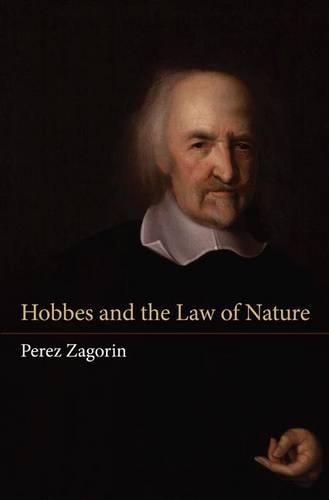
Hobbes and the Law of Nature
(Hardback)
Publishing Details
Hobbes and the Law of Nature
By (Author) Perez Zagorin
Princeton University Press
Princeton University Press
15th February 2010
United States
Classifications
Tertiary Education
Non Fiction
Social and political philosophy
Ethics and moral philosophy
192
Physical Properties
Hardback
192
Width 152mm, Height 235mm
425g
Description
This is the first major work in English to explore at length the meaning, context, aims, and vital importance of Thomas Hobbes's concepts of the law of nature and the right of nature. Hobbes remains one of the most challenging and controversial of early modern philosophers, and debates persist about the interpretation of many of his ideas, particularly his views about natural law and natural right. In this book, Perez Zagorin argues that these two concepts are the twin foundations of the entire structure of Hobbes's moral and political thought. Zagorin clears up numerous misconceptions about Hobbes and his relation to earlier natural law thinkers, in particular Hugo Grotius, and he reasserts the often overlooked role of the Hobbesian law of nature as a moral standard from which even sovereign power is not immune. Because Hobbes is commonly thought to be primarily a theorist of sovereignty, political absolutism, and unitary state power, the significance of his moral philosophy is often underestimated and widely assumed to depend entirely on individual self-interest. Zagorin reveals Hobbes's originality as a moral philosopher and his importance as a thinker who subverted and transformed the idea of natural law. Hobbes and the Law of Nature is a major contribution to our understanding of Hobbes's moral, legal, and political philosophy, and a book rich in interpretive and critical insights into Hobbes's writing and thought.
Reviews
"Zagorin's study is erudite, insightful and especially commendable for analyzing both the philosophical import and historical context of the ideas discussed."--Robin Douglass, Political Studies Review "Zagorin's book is a helpful introduction into the basics of Hobbesian politics, the prominent secondary debates, and the broader historical context of natural law theory, which will inspire many of its readers with a positive awareness of the potentially moral dimensions in Hobbes' political writings."--Ester Bertrand, Political Science Journal "Zagorin's book ... serves as a good introduction to Hobbes and the history of Hobbes scholarship as well as to the history of political philosophy more generally. It would be a suitable text for an upper-level undergraduate course on Hobbes as well as a graduate course."--Michael P. Krom, Historian
Author Bio
Perez Zagorin was the Joseph C. Wilson Professor of History Emeritus at the University of Rochester. His books include "Thucydides: An Introduction for the Common Reader" and "How the Idea of Religious Toleration Came to the West" (both Princeton).
